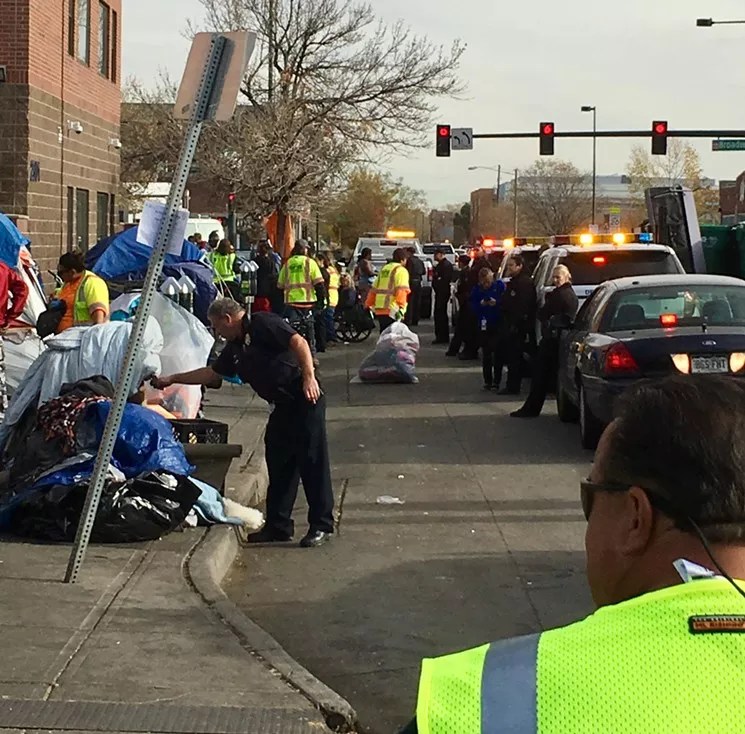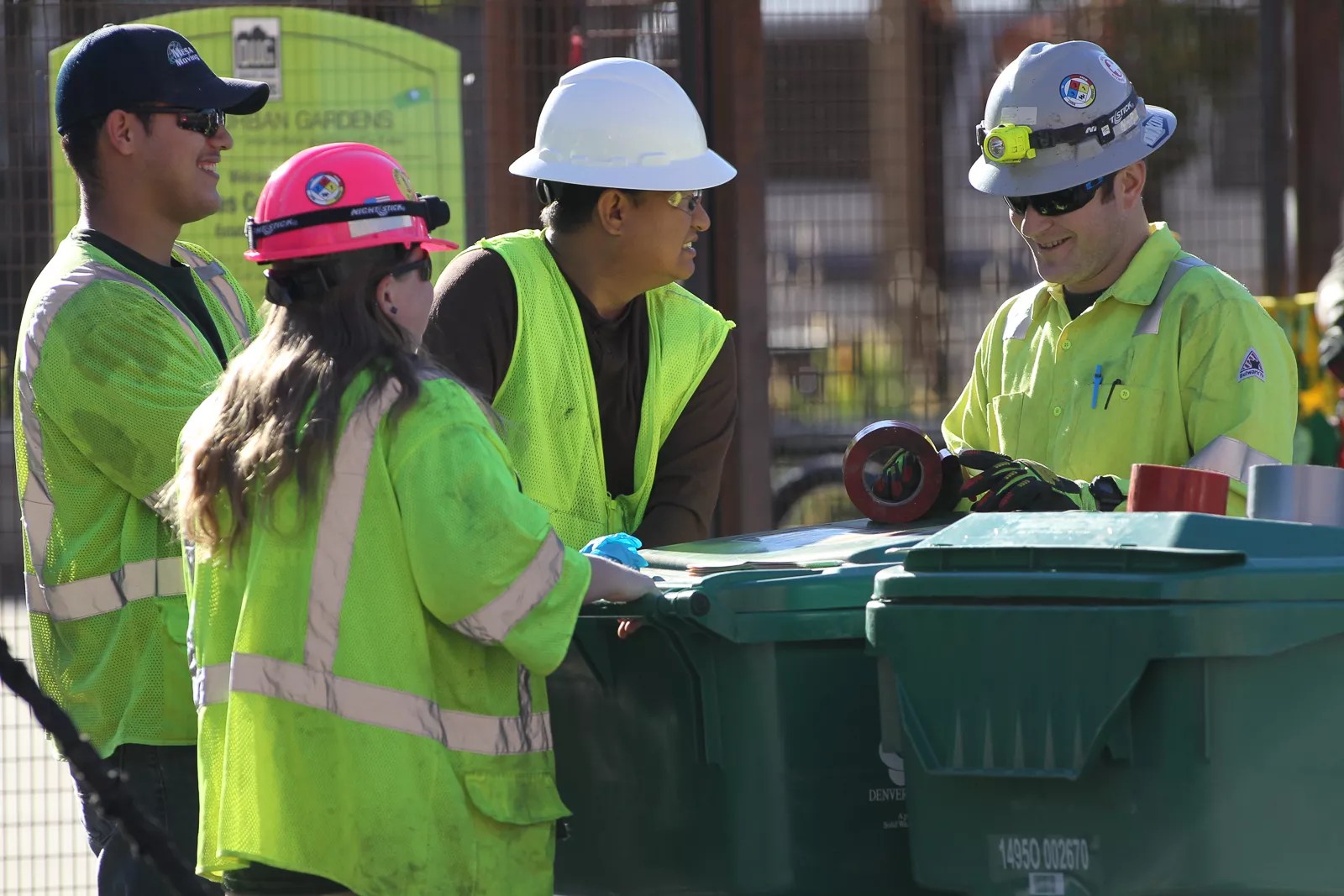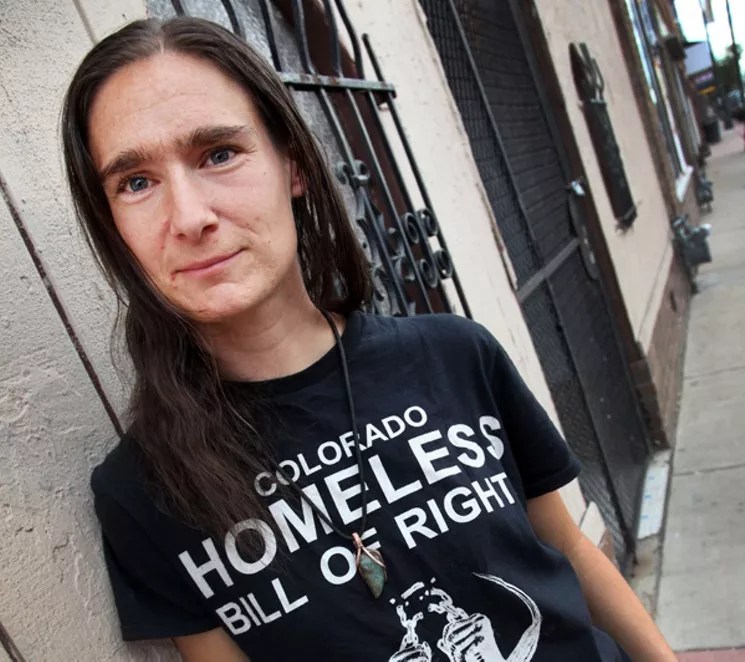
Chris Walker

Audio By Carbonatix
At a status hearing at the Alfred A. Arraj Federal Courthouse on Tuesday, March 5, lawyers representing Denver’s entire homeless population, as well as attorneys with the city, presented the terms of their proposed settlement to U.S. District Court Judge William Martinez.
During the hour-long hearing, Martinez appeared amenable to the terms. Even so, the wheels of federal court move slowly; upon laying out the additional procedural steps needed to ratify the settlement, the judge revealed that it may not be approved by the court until September.
The settlement would put to rest a class-action lawsuit that over the past two and a half years came to represent every person experiencing homelessness in Denver over concerns that their constitutional rights (to due process and equal protection) were being violated when Denver conducted large-scale encampment cleanups – particularly in instances when belongings of the homeless were allegedly trashed or confiscated during sweeps.
The case appeared headed to a jury trial in March (“a monster trial,” as lead plaintiff attorney Jason Flores-Williams put it at the time). But within the past month and a half, the city and the homeless plaintiffs’ attorneys – including Andy McNulty, of the civil-rights firm Killmer, Lane & Newman LLP – agreed on a number of strategies to notify people experiencing homelessness of impending cleanups and offer them more city services.
We’re thankful for you. Are you thankful for us?
We feel thankful for our staff and for the privilege of fulfilling our mission to be an unparalleled source of information and insight in Denver. We’re aiming to raise $50,000 by December 31, so we can continue covering what matters most to this community.
Help us continue giving back to Denver.
The terms of the proposed settlement include:
• Posting signs with seven days’ notice prior to large cleanups.
• Posting written notice of regular cleanups, including days and hours and locations, of where those will take place.
• Affixing a 48-hour notice to unattended items rather than removing them (when said items aren’t posing a health and safety risk).
• Having all notices include locations and hours of storage facilities where property taken during a cleanup can be retrieved without fear of arrest.
• Placement of 200 lockers at the Minori Yasui Building Plaza (at the intersection of West Colfax Avenue and Tremont Place, across from the City and County Building).
• Expanding the number of trash cans in the Ballpark neighborhood, along the South Platte River trail and along the Cherry Creek bike trail.
• Creation of an advisory group consisting of people experiencing homelessness who will give feedback to the city on programs and policies every quarter.
• Potential creation of a “mobile health unit” funded by the city.
• Development of a formal notification system for people whose personal property has been removed from public places.

Public Works and Custom Environmental Services employees storing items in recycling bins during a homeless sweep in November 2016.
Brandon Marshall
At Tuesday’s status hearing, McNulty introduced those terms to Judge Martinez, explaining some of the ideas, such as a proposed “mobile health unit,” in greater detail.
“I’ve told people it’s like a food truck for health supplies,” McNulty said of the idea. “It will have gauze, feminine products… . There will be naloxone, too.”
Martinez didn’t have many concerns about the specific line items of the settlement, but the judge wanted to be sure the city and plaintiffs’ attorneys had plans for mediating any disputes after the settlement goes into effect, “because I’m too damn busy to deal with every little dispute,” he added.
McNulty said that he and the city are acting on good-faith agreements, and that both sides have agreed that any future conflicts will be handled by the Denver District Court. There will also be a quarterly meeting between people experiencing homelessness and at least one member of the mayor’s staff to make sure the settlement is being honored.
During the hearing, Assistant City Attorney Wendy Shea told Martinez that the previous evening, Denver City Council had approved the proposed $30,000 settlement payment to the six named plaintiffs in the suit.

Terese Howard of Denver Homeless Out Loud.
Anthony Camera
Martinez, in turn, told the plaintiffs’ lawyers that they needed to advise their clients – in this case, all individuals experiencing homelessness in Denver – of the settlement before a final hearing could be set so they could raise any issues with it in court. Any problems would need to be resolved before the settlement could go into effect.
Flores-Williams told the judge that Denver Homeless Out Loud will use a street team to spread word of the settlement terms. He also plans to contact individuals receiving free lunches at Civic Center Park and said he might hold a large meeting with the homeless community at the Denver Central Library.
If all goes according to plan, the city and the plaintiffs’ lawyers can file a joint motion to finalize the settlement mid-April. From there, Judge Martinez estimated, it would take about five to six months to schedule a final hearing before the case is closed.
After the hearing, Flores-Williams told Westword that he believes the reason the city decided to settle the case rather than fight it out in a jury trial is because “what happened outside the courthouse was as critical as what happened inside the courthouse. You could see the effects of initiating this litigation: People who had seen themselves as being cast out and [unvalued] by people in power and law enforcement all of a sudden saw themselves as political. This is where I give Terese Howard [of Homeless Out Loud] a massive amount of credit. The position of being house-less became, in itself, a political statement about the nature of American society. And once people realized that and saw that what they were doing wasn’t just some after-effect, but that homelessness had its own meaning, then I think that became critical toward the city realizing that, along with what was happening inside the courthouse, there was something profound and righteous happening on the streets.
“Denver has experienced this intense growth spurt,” he continued, “and during that, the city began enacting all sorts of enforcements to clear the way for development. That happened in such a quick amount of time that perhaps constitutional rights were lost along the way. So what I’d like to think is that the city had a chance to catch its breath. This litigation gave the city a chance to stop and say, ‘Okay, here we are. What kind of city do we want to be?'”